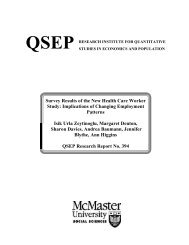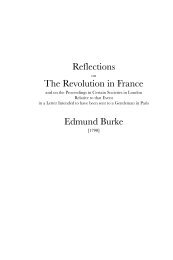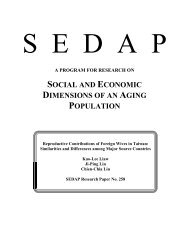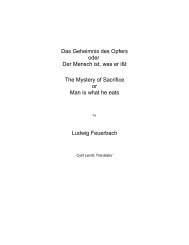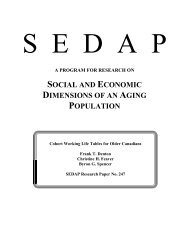Two Treatises Government John Locke - Faculty of Social Sciences ...
Two Treatises Government John Locke - Faculty of Social Sciences ...
Two Treatises Government John Locke - Faculty of Social Sciences ...
Create successful ePaper yourself
Turn your PDF publications into a flip-book with our unique Google optimized e-Paper software.
22/<strong>John</strong> <strong>Locke</strong>part <strong>of</strong> men over another; which is yet more evident from the very nextwords, ver. 3, where God gives every :/9 “every moving thing,” thevery words used ch. i. 28, to them for food. By all which it is plain thatGod’s donation to Adam, ch. i. 28, and his designation, ver. 26, and hisgrant again to Noah and his sons; refer to, and contain in them, neithermore nor less than the works <strong>of</strong> the creation the fifth day, and the beginning<strong>of</strong> the sixth, as they are set down from the both to 26th ver. inclusively<strong>of</strong> the 1st ch. and so comprehend all the species <strong>of</strong> irrationalanimals <strong>of</strong> the terraqueous globe; though all the words, whereby theyare expressed in the history <strong>of</strong> their creation, are nowhere used in any <strong>of</strong>the following grants, but some <strong>of</strong> them omitted in one, and some inanother From whence I think it is past all doubt that man can not becomprehended in this grant, nor any dominion over those <strong>of</strong> his ownspecies be conveyed to Adam. All the terrestrial irrational creatures areenumerated at their creation, ver. 25, under the names, “beasts <strong>of</strong> theearth, cattle, and creeping things;” but man, being not then created, wasnot contained under any <strong>of</strong> those names; and therefore, whether we understandthe Hebrew words right or no, they cannot be supposed tocomprehend man, in the very same history, and the very next versesfollowing, especially since that Hebrew word :/9 which, if any in thisdonation to Adam, ch. i. 28, must comprehend man, is so plainly used incontradistinction to him, as Gen. vi. 20. vii. 14, 21, 28. Gen. viii. 17,19. And if God made all mankind slaves to Adam and his heirs, bygiving Adam dominion over “every living thing that moveth on the earth,”ch. i. 28, as our author would have it; methinks sir Robert should leavecarried his monarchical power one step higher, and satisfied the worldthat princes might eat their subjects too, since God gave as full power toNoah and his heirs, ch. ix. 2, to eat “every living thing that moveth,” ashe did to Adam to have dominion over them; the Hebrew word in bothplaces being the same.§28. David, who might be supposed to understand the donation <strong>of</strong>God in this text, and the right <strong>of</strong> kings too, as well as our author, in hiscomment on this place, as the learned and judicious Ainsworth calls it,in the 8th Psalm, finds here no such charter <strong>of</strong> monarchical power: hiswords are, “Thou hast made him, i.e., man, the son <strong>of</strong> man, a little lowerthan the angels; thou madest him to have dominion over the works <strong>of</strong>thy hands; thou hast put all things under his feet, all sheep and oxen, andthe beasts <strong>of</strong> the field, and fowls <strong>of</strong> the air, and fish <strong>of</strong> the sea, andwhatsoever passeth through the paths <strong>of</strong> the sea.” In which words, if




